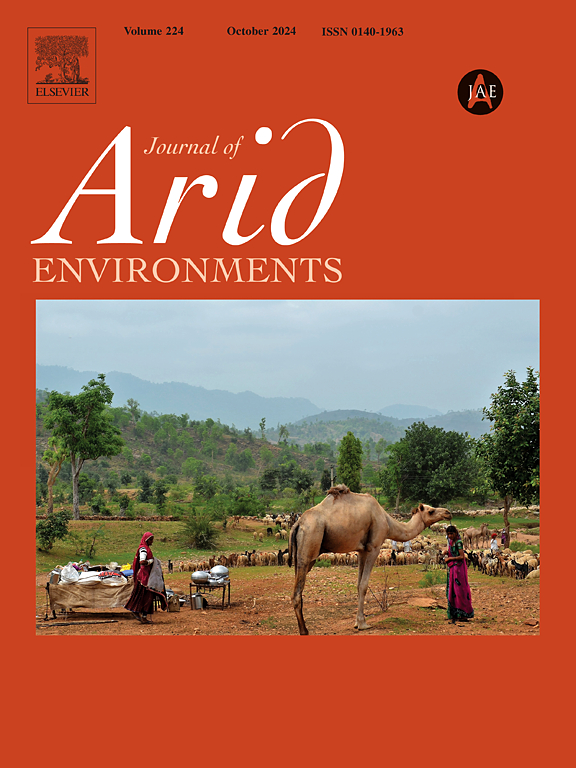Cactus (Opuntia ficus-indica) diets reduce voluntary water intake, water footprint and enteric methane production improving ruminal fermentation in steers
IF 2.6
3区 环境科学与生态学
Q2 ECOLOGY
引用次数: 0
Abstract
We investigated the viability of Opuntia ficus indica (or cactus), as nutritional substitute for alfalfa (Medicago sativa) and orchardgrass (Dactylis glomerata) hays, assessing its effects on greenhouse gas emissions, water intake, and water footprint. Fermentation kinetics were assessed using in vitro gas production technique with two ruminally cannulated Angus steers as inoculum donors. Forage types were incubated in serum bottles over three runs for 48 h to analyze fermentation characteristics. In vitro digestion kinetics evaluated cactus forage inclusion at 40%, 60%, 80%, and 100% on a dry matter basis. Computer simulations estimated the of cactus diets on water usage. Data were analyzed as completely randomized design, with diet as fixed and runs as random effects. Results showed cactus reduced CH4 and increased CO2 production higher with cactus compared to hay (P < 0.05). Rumen pH, propionate, and digestibility increased with cactus inclusion, while acetate, isobutyrate, isovalerate, and valerate decreased in orchardgrass diets (P < 0.05). Cactus also reduced water intake and footprint (P < 0.001), offering a viable option to lower methane emissions without affecting cattle performance. Cactus fermentation enhances digestibility and propionate production and produces less methane compared to alfalfa and orchardgrass while still maintaining high dry matter digestibility.
仙人掌(Opuntia ficus-indica)日粮可减少牛自愿摄水量、水足迹和肠道甲烷产量,改善瘤胃发酵
我们研究了仙人掌作为苜蓿(Medicago sativa)和果园草(Dactylis glomerata)的营养替代品的可行性,评估了其对温室气体排放、水摄入量和水足迹的影响。采用体外产气技术,以2头瘤胃空心安格斯阉牛为接种体,对发酵动力学进行了评价。饲料类型在血清瓶中连续3次发酵48 h,分析发酵特性。在干物质基础上,体外消化动力学评估了仙人掌饲料在40%、60%、80%和100%的掺入率。计算机模拟估计了仙人掌饮食对水的消耗。数据分析采用完全随机设计,饮食固定,跑步随机。结果表明,与干草相比,仙人掌减少了CH4,增加了CO2的产生(P <;0.05)。随着仙人掌的加入,瘤胃pH、丙酸和消化率增加,而乙酸、异丁酸、异戊酸和戊酸降低(P <;0.05)。仙人掌也减少了水的摄入量和足迹(P <;0.001),提供了在不影响牛生产性能的情况下降低甲烷排放的可行选择。与苜蓿和果园草相比,仙人掌发酵提高了消化率和丙酸产量,产生的甲烷较少,同时仍保持较高的干物质消化率。
本文章由计算机程序翻译,如有差异,请以英文原文为准。
求助全文
约1分钟内获得全文
求助全文
来源期刊

Journal of Arid Environments
环境科学-环境科学
CiteScore
5.70
自引率
3.70%
发文量
144
审稿时长
55 days
期刊介绍:
The Journal of Arid Environments is an international journal publishing original scientific and technical research articles on physical, biological and cultural aspects of arid, semi-arid, and desert environments. As a forum of multi-disciplinary and interdisciplinary dialogue it addresses research on all aspects of arid environments and their past, present and future use.
 求助内容:
求助内容: 应助结果提醒方式:
应助结果提醒方式:


